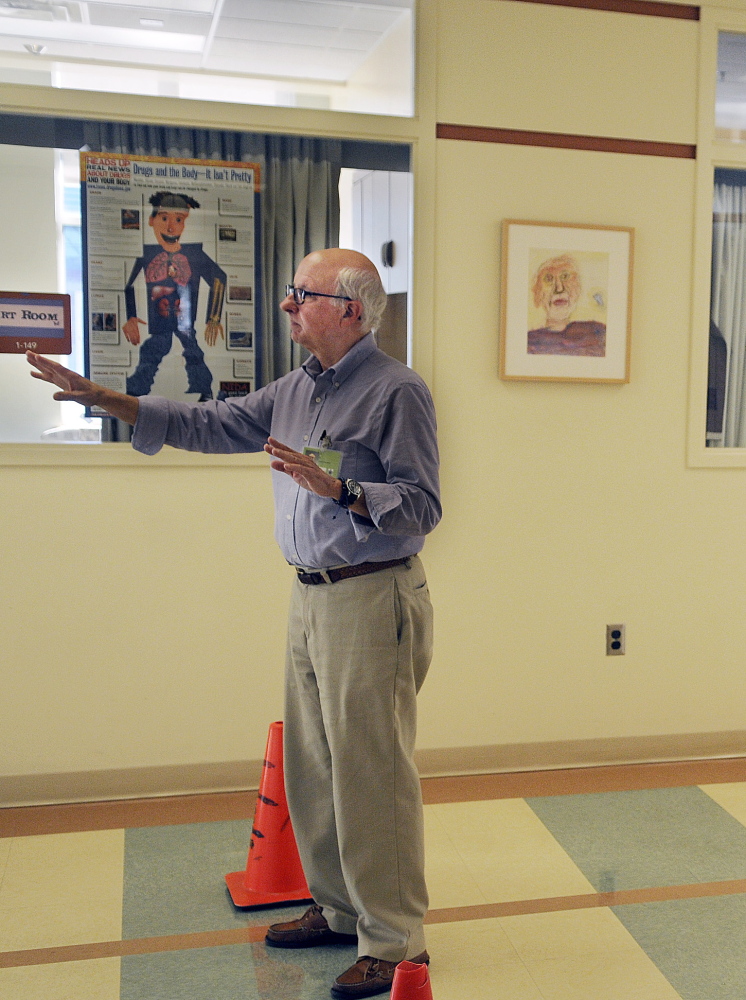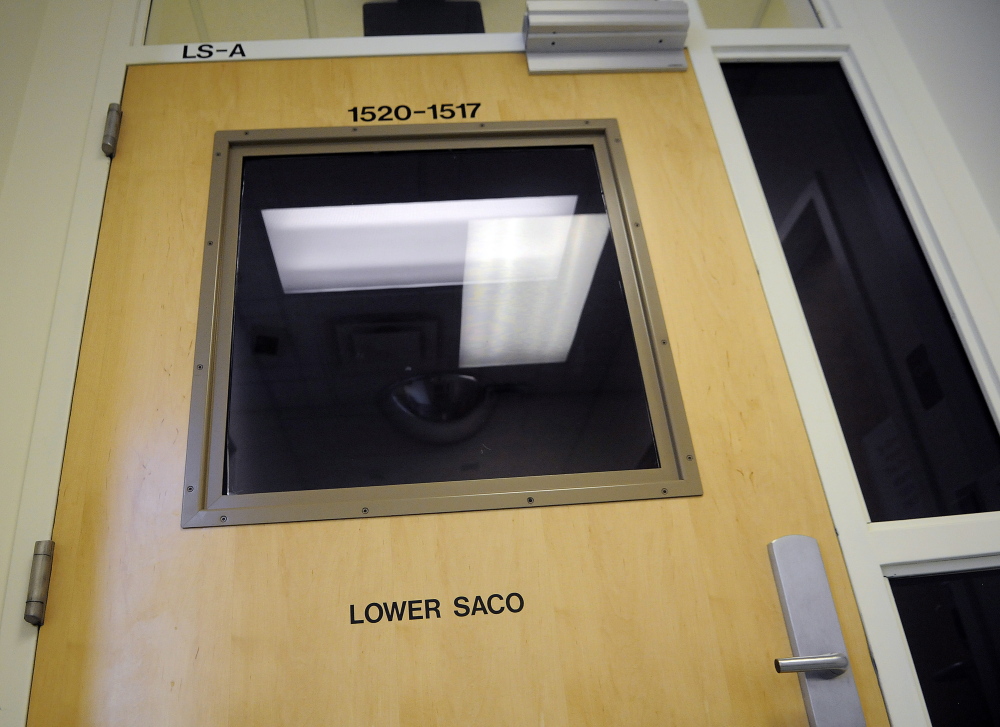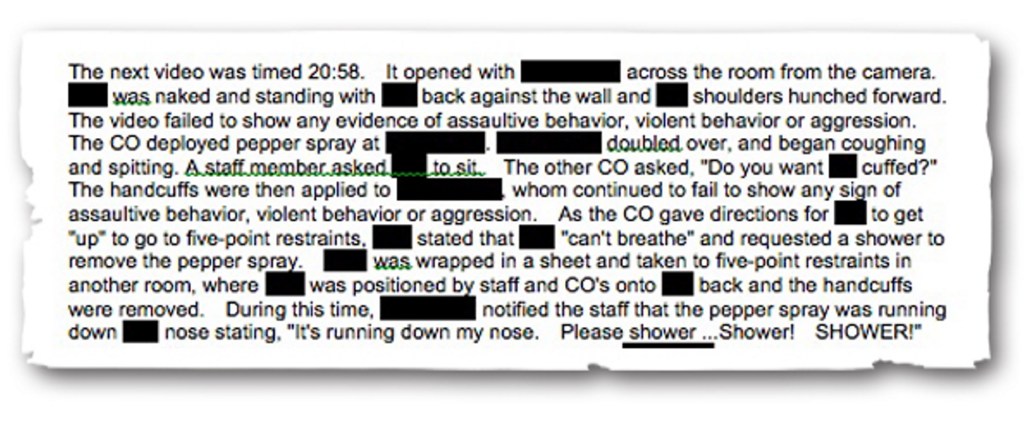Arlene Edson cowered in her room at Riverview Psychiatric Center when a corrections officer burst in, coated her with pepper spray and forced her into restraints.
Alone and strapped to a bed, she cried out for relief. For three hours, no one helped.
“I felt like I was burning all down my back. I screamed for a shower for hours but they wouldn’t let me take a shower,” said Edson, 30, who has been living in Riverview since 2011, after she says she was found not criminally responsible for charges of arson and assault because of her mental illness. Her account matches a state investigatory report obtained this month by the Maine Sunday Telegram, which concluded that staff acted improperly, failed to immediately report the Dec. 2 incident – as required by law – and exaggerated Edson’s actions to make it seem like the pepper spraying was justified. Edson was also held in restraints for more than four hours prior to the pepper spray incident, according to the report.
The incident last December is emblematic of what Riverview employees say are widespread patient abuse and neglect at the 92-bed state-run hospital in Augusta in recent years – issues that point to deep dysfunction that has persisted even after federal officials detailed serious violations affecting patient care. Current and former employees say patients are routinely provoked, denied care and refused food at the whim of lower-level staff members.
But Jay Harper, the new interim superintendent at Riverview, said although the hospital has weathered problems, it is not as flawed as critics have portrayed. Since he started in March, he said, the hospital has made great progress, including changing the way the hospital handles restraining or secluding patients.
“Riverview was a hospital that treated its patients well, but the patients are treated better now,” Harper said.
Forensic patients make up about half of the people in Riverview, sent there through the criminal court system but found not responsible for their actions, while the other half are civil patients, most often involuntarily committed or more rarely choosing to attend Riverview after experiencing a mental health emergency. The two groups are sometimes housed in the same unit, though the hospital tries to separate them.
The hospital lost its federal certification and the $20 million that goes with it in September 2013, after reports of officers using stun guns and handcuffs on patients, along with other problems meeting federal requirements. Attempts to regain certification failed this year when federal inspectors again found deficiencies, including medication errors and substandard treatment.
At least 10 current and former employees have come forward in recent weeks complaining about the work culture at Riverview, describing a dysfunctional environment that allows patient abuse to be too common. Five detailed numerous issues at Riverview in separate interviews with the Telegram. Five more, all of whom are currently working at Riverview, met privately with lawmakers two weeks ago complaining of nearly identical problems that are still going on, legislators said.
While cases of patients attacking staff members have made the news in recent years, the employees say far more common is patient abuse by employees. And mental health workers – often high school graduates with no formal education in health care and minimal instruction beyond the training required to begin employment – sometimes provoke reactions from patients and are left to make decisions that should be made only by clinical staff, they say.
In addition, a psychiatrist who works at Riverview said the state’s failure to require patients to take prescribed anti-psychotic medications in the Lower Saco unit, where the most acutely ill forensic patients live, makes the unit a dangerous place for staff members and patients.
“Riverview has created the conditions where people remain in a psychotic state for up to a year,” said Dr. Jean-Joseph Dansereau, a psychiatrist on a temporary assignment at the hospital. “There are real consequences for these (administrative) decisions. The patients act on their deliriums and create a dangerous situation for patients and staff.”
Jenna Mehnert, executive director of the Maine chapter of the National Alliance on Mental Illness, or NAMI, said she’s repulsed by Edson’s treatment and alarmed at the breadth of problems at Riverview.
“Individuals and families are so desperate to get into treatment facilities, for any kind of help, and this is what we’re sending them to?” Mehnert said.
Riverview fired its former superintendent, Mary Louise McEwen, in March. She was almost immediately replaced by Harper, a former patient advocate for the Disability Rights Center in Augusta.
Rep. Richard Farnsworth, D-Portland and House chairman of the Legislature’s Health and Human Services Committee, said Riverview needs a complete overhaul.
“People who are sent there are mentally ill, and yet they’re not receiving treatment. So why the hell are they there and what are we spending all that money for?” said Farnsworth, one of three lawmakers who met with current employees. Riverview’s annual budget is about $35 million.
Harper said while some of the criticisms leveled at Riverview were accurate months ago, he’s been working on reforms since the day he started.
Corrections officers who had been on site regularly at the hospital were removed this year and replaced by Capitol Police and security guards, a process that was in the works before Harper started. Harper said he has worked to de-emphasize the role of the remaining police and guards and involve them as little as possible with patient problems.
“We’re a hospital, not a correctional facility,” he said. The pepper spray incident “should not have happened.”
‘NOBODY EVER APOLOGIZED’
State investigators with the Maine Division of Licensing and Regulatory Services reviewed videotape of the day that Edson was pepper sprayed. They concluded that the Fryeburg woman’s treatment constituted abuse and described in a March report a blow-by-blow of what happened on Dec. 2.
“I still don’t understand to this day why they did it. I don’t feel safe here,” Edson told the Telegram in a phone interview from Riverview. She said she suffers from post-traumatic stress disorder and depression. Because of her illness, she said she was found not criminally responsible for arson and assault charges, after serving some time in the Windham Correctional Center for a separate assault charge for which she was found guilty.
On Dec. 2, Edson had gotten into a verbal dispute with a corrections officer in a common area. She began undressing as she walked to her room, which the staff identified as defiant behavior.
William Lord, the nurse on duty, told her, “I’ll go with the three-strike rule basically, if we gotta do that,” according to the report. Edson threw and kicked her clothing out of her room, according to the report.
About 9 p.m., she was standing naked and in a “defenseless pose” in her room, with her shoulders hunched forward when a corrections officer pepper sprayed her. Edson “doubled over, and began coughing and spitting,” the report said.
She was handcuffed, taken to an isolation room and put into a five-point restraint, in which patients are placed on a bed and nylon straps tied around their ankles, wrists and chest, greatly restricting movement, according to the report. Edson repeatedly asked for a shower, said she couldn’t breathe, coughed and whimpered. After she complained about pepper spray running down her nose, a mental health worker wiped her nose with a cloth. She said her side was burning, and an unidentified staff member replied, “If it was burning that bad, you would know what to do to get out of here, but you aren’t.”
The investigators noted that Edson appeared passive and cooperative. Yet, she was left in restraints for nearly three hours.
A nurse finally released her at 11:50 p.m. Prior to the pepper spraying, Edson had been in restraints for about four hours and 15 minutes for an unspecified reason, for a total of more than seven hours in restraints over an eight-hour period. According to Riverview’s own policy, restraints and seclusion “are considered emergency measures or interventions of last resort.”
The investigators concluded that notes written by hospital employees about the lead-up to the pepper spraying were misleading, making it seem as if Edson was more combative with staff than she was, that staff tried to calm her down when there was no evidence of them de-escalating the event, and claiming that she kicked two holes in the wall, one “smaller and one larger hole.” There were no holes in the wall, according to the report.
The report also noted that staff failed to follow hospital procedures after Edson was pepper sprayed, which are to “provide fresh air” and “irrigate with copious amounts of cool water.”
Edson told the Telegram that she was kicking the wall, but did not make any holes, and she said she only kicked the wall once before being sprayed.
She said she sometimes thinks about the pepper spray incident, and it still bothers her.
“It kind of upsets me and makes me feel alone,” Edson said.
Edson was given anti-psychotic medication at about 1:20 a.m. after she was still “wound up and couldn’t sleep due to the burning,” according to the report.
Riverview nurses who reviewed the video with state investigators and who were not directly involved in the incident told them that proper procedures were not followed, and that the clinical staff was “not engaged” in Edson’s care.
“Why would you spray someone who is standing there?” nurse Colleen Cutler is quoted as saying in the report.
Another nurse, Jaime Meader, said in the report that the presence of corrections officers was “outside the culture of the recovery model” and was about controlling patients, not treating them. “It wasn’t working. Nobody knew what to do or when to do it,” she said.
Investigators asked Lord, the nurse on duty during the incident, whether he thought the spraying and restraint were abuse.
“Mr. Lord stated that he did not think this incident was abuse. He stated that anytime the staff have to call the police, it was because of criminal action,” the report said. When Lord was shown the definition of abuse in the Riverview policy manual, he “stated that he was surprised they are not looking at other incidents given this definition.”
An attempt to contact Lord for this story was not successful.
Medical professionals are required to report abuse to Adult Protective Services, an office of the Department of Health and Human Services, within one day, yet the incident with Edson was not reported until Feb. 26, according to the report. Failing to report abuse is a violation of state law, but there is no indication anyone was criminally charged for failing to report abuse.
How and why it was eventually reported is not clear from the report.
Riverview employees interviewed for this story said that the hospital’s culture is to look the other way when other workers abuse patients.
“The attitude is, ‘Oh, we didn’t see anything happen. The client did it. He’s the crazy one,’ ” said Tina Ashlock, a nurse who resigned in January because she disagreed with the way the hospital was being operated.
In response to the incident, Harper said, one employee was fired and a contracted worker was no longer permitted to be on the Riverview campus. Employee personnel records are confidential.
Edson said she didn’t know a report was written or that the hospital staff was cited for wrongdoing until being told by the Maine Sunday Telegram. She said no one from the hospital has admitted that what happened to her was wrong.
“Nobody ever apologized to me. The only thing people said was, ‘Next time remember to behave,’ ” Edson said.
‘EVERYONE COMES RUNNING’
Daniel Wathen is a former Maine Supreme Judicial Court chief justice who was appointed court master on a case involving Riverview’s predecessor, the Augusta Mental Health Institute. As part of a court consent decree, Wathen is tasked with making sure Riverview is operating smoothly and that patients are treated well. AMHI was shuttered in 2004 after experiencing problems over decades.
“There’s unfortunately too many similarities between now and then,” said Wathen, comparing AMHI in 2003 to Riverview today. At AMHI “there was an absence of active treatment (and) too much reliance on seclusion and restraint.”
Wathen said he viewed the video of what happened to Edson and was so disturbed by what he saw that he has decided to conduct a formal investigation of Riverview operations, to begin next month.
“I thought it was terribly wrong and totally unjustified and it was a serious reflection on the staff,” Wathen said of the pepper spraying.
Current and former employees interviewed by the Telegram and employees who met with lawmakers said it’s not surprising that such an incident occurred. The workforce culture makes such events likely, as staff members routinely provoke responses from patients, they say, and anyone who reports patient abuse is ostracized.
Harper said the reverse is true, in that employees are encouraged to report every incident of patient abuse. And because there are “cameras everywhere,” such disturbances would be difficult to hide, he said.
“That is really hard for me to believe,” Harper said. “Anything that happens regarding patient abuse is being reported to me.”
But the employees insist that the culture of abuse persists, and that employees protect one another by not reporting mistreatment of patients.
Many problems, employees say, stem from “stat calls.” When a patient becomes agitated, a mental health worker presses a button and employees arrive to subdue the patient. The stat calls sometimes end with the patient being put in restraints or confined in an isolation room and have become routine rather than a rare tool used to control dangerous behavior, the workers say.
Mental health workers are frontline employees – the lowest on the totem pole in the employee hierarchy – but often have the most interaction with the patients.
Gary Cromwell, a former mental health worker who left in May to pursue other work, said that nearly all stat calls are caused by staff provoking patients, rather than necessary for patient care.
“People press a button and everyone comes running,” said Judith Dorsey, a former licensed social worker who was fired by Riverview in late spring over a dispute regarding doing personal business on work time. Dorsey said in most cases it is inappropriate, embarrassing to the patient and only makes relations between patients and staff worse.
Staff should be trained in methods that redirect or deflect patient anger, including giving people space so they don’t feel crowded and employing de-escalation techniques, such as talking slowly and avoiding direct orders, Mehnert said.
Dorsey said the workers know they have the upper hand and use the stat call as a way to taunt patients who irritate them or are verbally threatening.
“People will raise their fists and say, ‘You say you’re going to hit me? Well, bring it on,’ ” Dorsey said.
Cromwell said personal dislike of clients fuels many of the stat calls.
“Patients are provoked to create a psych emergency,” Cromwell said, and many times the results are unnecessarily physical. “I’ve seen mental health workers completely leave the floor and tackle a patient from behind. It’s pretty crazy.”
The workers try to control and punish patients by withholding food, employees said. Any diet restrictions are required to be made by a medical professional. Yet, if a client acts up, instead of receiving a normal dinner, the patient may instead be served a peanut butter and jelly sandwich. Ashlock, the nurse, said a typical back-and-forth would be an argument over a snack, and then “two seconds later fists would be flying.”
‘NOT SET UP TO HELP THE CLIENTS’
Cromwell said mental health workers like himself had little direction and training from supervisors, who often seemed uninterested in treating patients. That left the workers making decisions on the fly. Annual training is nonexistent, Cromwell said, as employees used to have one three-hour training session per year. That was cut back to a questionnaire. A few employees would figure out the correct answers to the annual questionnaire, and then photocopies were made for the rest of the staff, he said. The workers were ill-equipped to deal with some of the most difficult mental health cases in the entire state.
“The system is not set up to help the clients at all,” Cromwell said.
Mehnert said NAMI has offered to visit Riverview and train staff on how to handle difficult patients but has yet to hear back from management.
Harper said the training issue, while a legitimate complaint before he started, is being addressed. The training budget has increased from $4,000 to $60,000, he said. Some training will start this week, he said, with continuing education and more emphasis on diversionary and de-escalation tactics with patients.
Georgia Gunning, a licensed social worker on paid administrative leave, said patient treatment plans are often generic and not individualized, just a cut-and-paste job. Progress reports are often nonexistent, she said. Inspectors with the U.S. Centers for Medicare and Medicaid Services, or CMS, in a surprise inspection this spring, also found treatment plans and progress reports to be deficient.
Gunning said therapy sessions, instead of working through problems and issues the patients have, devolved into busywork, such as coloring or other menial activities.
“How is that helping to treat the patient?” asked Gunning, who said she is on leave regarding a dispute with management over patient records unrelated to her accounts of hospital mismanagement.
Harper said treatment plans have been revamped and tailored for individual patients, in response to the CMS criticisms. Patients are now in “real therapy” sessions throughout the day and not given busywork.
“The whole system we had before is gone,” Harper said. “We have a brand-new system now.” Harper said they hired three additional psychologists, and the treatment plans were redone to be individualized and within CMS guidelines.
Wathen said after Riverview opened in 2004, conditions for patients improved until about three years ago. Starting around 2010, he noticed that the hospital was more likely to mix forensic and civil patients, which he viewed as a potential problem, and that the use of restraints and seclusion was increasing.
Restraint and seclusion rates must be reported to CMS, and the hospital performs worse than the national average in both categories, according to the most recent federal report.
Seclusion rates in particular are dramatically higher than the national average, at 2.39 hours per 1,000 hours of patient care. The national average for patients in psychiatric care is 0.2 hours. According to Riverview’s internal quarterly reports, the use of seclusion has declined dramatically this spring and summer.
Harper said that’s because of reforms instituted this spring, including hiring “acuity specialists” to work one-on-one to calm agitated patients and requiring a doctor to see the patient in person before signing an order allowing the seclusion to occur.
“There are a lot of incentives built into the system now for employees to find alternative ways to deal with situations other than seclusion,” Harper said. Riverview has eight acuity specialists with plans to double that number by 2016.
Mehnert said NAMI this fall will be advocating reforms to address the use of restraints and seclusion.
Wathen said incidents in recent years in which staff members were injured have caused problems in the workforce and made them less effective. “They feel threatened, on edge. I’m not saying that as justification for what has happened.”
Two high-profile incidents occurred in August. Frank Stewart was charged with aggravated assault for an incident Aug. 16 when he allegedly hit a nurse in the face with a chair. Charles D. Miles is charged with destroying property and making threats in an Aug. 31 incident.
Dansereau, the Riverview psychiatrist, said in the Lower Saco unit, which houses about 20 patients, the decision by the state not to require patients to take their medications is creating a dangerous environment for staff members, who do their best to handle patients but often have to deal with unpredictable outbursts. Dansereau said about half of the patients in Lower Saco refuse to take their medications, and that results in many psychotic episodes that could be avoided.
He pointed to two U.S. Supreme Court decisions that found that, with due process, a state may medicate people who are incarcerated or accused of a crime against their will if the treatment is deemed to be in their best interest. Dansereau wrote in a letter to the Maine attorney general that Riverview has refused to install any protocol to do so. That leaves the staff only able to medicate patients against their will when the patients are putting themselves or others in imminent danger, even as some remain in a psychotic state for up to a year.
“All we can do is react. We go from battle to battle,” Dansereau said. “We can’t provide proper treatment that allows the patients to get well and get on with their lives.”
Dansereau said he brought the issue up to various officials, including Harper, DHHS Commissioner Mary Mayhew and others, but was ignored.
“They have created the most dangerous psychiatric unit I’ve ever seen,” said Dansereau, who has more than 25 years of experience, including at Atascadero State Hospital in California.
Harper said the issue of when to medicate patients against their will has divided psychiatrists at Riverview, and any changes to those procedures would be best addressed by the Legislature.
‘NOT AN EASY JOB TO CHANGE DIRECTION’
Whether Harper can make the deep changes necessary to improve care at Riverview is unclear, said Helen Bailey, an attorney with the Disability Rights Center, which advocates for patients at Riverview and where Harper previously worked.
“There is no doubt the staff is demoralized,” Bailey said. “The jury is still out. It’s not an easy job to change direction.”
Some of the plans put forward by Harper seem good on paper, Wathen said, but the key is executing the changes.
Wathen said he’s somewhat encouraged by reforms at the hospital that allow for more efficient discharge of forensic patients into the community, which frees up beds at Riverview. This results in fewer forensic patients being housed where the civil patients are being treated.
Meanwhile, the shift from corrections officers to Capitol Police and security guards also is significant. Last year, Kennebec County sheriff’s deputies also were present, but they have been removed from Riverview.
Harper said the philosophy of the hospital has changed from a more correctional center-type atmosphere to a clinical hospital.
Even so, Farnsworth said he believes any police and security guard presence is not helpful to the climate at Riverview.
“If the employees are trained appropriately, the guards are not needed,” Farnsworth said. “It requires a change in attitude and a change in mindset from a control relationship with patients to a treatment relationship.”
Farnsworth said “transformative” reforms are needed, and he’s not seeing them yet.
Riverview must show improvement to regain its federal certification and the $20 million in federal funding that comes with being in the good graces of CMS. Harper said he believes it could be recertified as soon as this fall. The goal is not only to comply with CMS, he said, but to provide “high-quality, cutting-edge care.”
But Rep. Drew Gattine, D-Westbrook, who sits on the Health and Human Services Committee, said “it looks to me like we’re going backward.”
“We’re coming on two years since we’ve known there’s problems,” he said. “I don’t see it getting any better.”
For Edson, problems continue.
She doesn’t know when she’s getting out of Riverview, and she said she doesn’t feel any better about her mental health. She said she was put in restraints the first week of September for behavioral issues and suffered bruises on her arm.
“I don’t think I’m getting better at all,” Edson said quietly. “I think I’m getting worse.”
Send questions/comments to the editors.

















Success. Please wait for the page to reload. If the page does not reload within 5 seconds, please refresh the page.
Enter your email and password to access comments.
Hi, to comment on stories you must . This profile is in addition to your subscription and website login.
Already have a commenting profile? .
Invalid username/password.
Please check your email to confirm and complete your registration.
Only subscribers are eligible to post comments. Please subscribe or login first for digital access. Here’s why.
Use the form below to reset your password. When you've submitted your account email, we will send an email with a reset code.